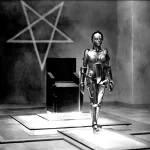Home Video Hovel- Tales from the Golden Age
The composite film structure has always been hit-or-miss. Especially in cases where there are multiple directors, these films can sometimes come off as unwieldy, disconnected and even disorienting. Even in some positive cases (of which I would consider Paris, je t’aime one), certain segments may not appeal to the general viewers, and can throw off audiences for the remainder of the feature. Romanian composite film Tales from the Golden Age has enough of a cohesive style and concentrated setting to ensure viewers that the shorts within the feature belong together.
The first good sign is that although the individual “legends” in the film were directed by different Romanian filmmakers, the scripts were all written by one man – writer/director Cristian Mungiu (possibly best known for 4 Months, 3 Weeks & 2 Days). Mungiu then commissioned several other talented Romanian filmmakers to collaborate with him on the project.
A little history lesson may help to give you some context for the film’s subject matter. Romania was under communist rule from the end of World War II until 1989. The country’s dictator (or General Secretary, as he called himself) Nicolae Ceauşescu was in power from 1965 until the revolution in 1989. The 80’s saw some of the worst living conditions and government corruption Romania had ever known. Not surprisingly, the powers that be assured citizens that they were living in “the Golden Age,” and the term became widely used by the Ceauşescu propaganda machine. Tales from the Golden Age takes several urban legends from the Romanian 80’s, and uses them together as a pointed political satire.
Many of these stories revolve around the absurdities forced on people living under an oppressive communist regime. However, you don’t have to know the specifics of communist Romania to know that government bureaucracy can run amok. The situations (and the comedy that often arises from them) are universal enough that they are effective outside of the film’s immediate audience. The humor isn’t forced either. The film as a whole isn’t a laugh-a-minute riot, but the jokes come naturally, often out of the believably absurd situations.
One example: the first “legend” is about a small provincial town preparing for a political motorcade to pass through. The town pulls out all of the stops, decorating the road with banners and flags and even bringing food, gifts and children with practiced poems (never mind the fact that the motorcade is not scheduled to stop there). When two party inspectors come through to check on the town, they stop to dine with the locals. That night, one of the party members gets a phone call from his superiors – the motorcade is no longer coming and the parade should be cancelled. In his haste to cheer up the locals, the man insists that everyone hop onto a carnival carousel for a ride. He is so insistent that “everyone” go for a ride, that even the carnival operator hops on and they suddenly realize no one is there to stop the ride. An epilogue tells us that, as legend has it, the town leaders and party members were still spinning on the carousel when the motorcade DID arrive, after all.
The film is surprisingly accessible for American audiences. The stories are simple, contained and relatable. The actors, for the most part, know how to play understated comedy and keep the humor tethered reasonably to the ground. None of the filmmakers has a distinct vision enough so for their “legends” to stand out. Though this might elsewhere be seen as a flaw, it actually works in the film’s favor. A showy director’s work would stand out like a sore thumb, disrupting the flow of the piece as a whole. There is a very slick title sequence that it could be argued doesn’t fit with the rest of the film’s styl but either way it’s a lot of fun to watch.
The DVD release is pretty bare-bones. The quality of the picture, sound, and subtitles is great, but there are no special features. It’s disappointing because it seems like there could at least be some interesting interviews, since all of the film’s directors lived through the Ceausescu regime.
You may have never thought you’d find anything to enjoy in a Romanian historical comedy. But Tales from the Golden Age is refreshingly enjoyable and accessible. With a clear unified focus, the film’s separate storylines are still tied together, and seem more like The Decalogue, and less like Four Rooms. It’s certainly a must-see for anyone interested in Romanian history and culture, but will still be good fun for those who know less than nothing about it.































